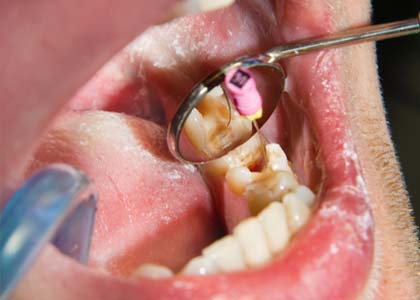Indianapolis residents ask, “What causes gum disease?”
Many Indianapolis patients think that gum disease is an inevitable consequence of aging. However, it is possible to have healthy teeth and gums for a lifetime with proper care. Gum disease is an infection of the gum tissue surrounding the teeth. While early stages of gum disease are easily treated, advanced gum disease can cause serious damage including tooth loss.

What causes gum disease?
Gum disease is most commonly caused by a lack of proper oral hygiene, more specifically, when there is a buildup of plaque in the mouth.
When we consume sugary foods or beverages, the sugars react with the bacteria to form acidic plaque. Plaque can be removed by brushing and flossing, however the process will continue to repeat itself as new plaque forms. When plaque is left on the teeth for days at a time, it can begin to harden under the gum line and turn into tartar. Tartar is impossible to remove through brushing and flossing along and must be removed by a professional cleaning.
When plaque and tartar remain on the teeth, they begin to irritate and inflame the gum tissue. This can cause chronic bad breath and bleeding of the gums during brushing. If left untreated, pockets will eventually form between the gum and teeth. As these pockets deepen, bacteria can cause deep infections and lead to a loss of teeth, bone, and tissue.
Symptoms of gum disease
Identifying the signs of gum disease early is extremely important to prevent irreversible damage. The most common signs of gum disease include:
- Swollen, red gums
- Bleeding while brushing or flossing
- Chronic bad breath
- Loose or shifting teeth
While gum disease can wreak havoc on the mouth, it’s important to remember that good oral hygiene and regular dental visits will ensure that any signs are caught early.
Share this Article
Back to Gum Disease Page





